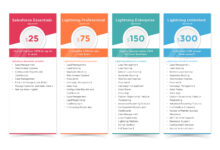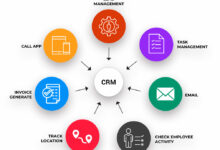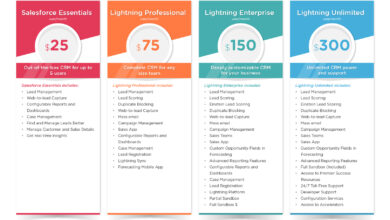CRM With AI Chatbot Integration: Enhancing Customer Relationships
CRM with AI Chatbot Integration revolutionizes customer interactions, providing a seamless blend of technology and personalized service for optimal results. Dive into the world where artificial intelligence meets customer relationship management.
The integration of AI chatbots in CRM systems offers a myriad of benefits, transforming how businesses engage with their customers and streamline operations.
Overview of CRM with AI Chatbot Integration
Customer Relationship Management (CRM) is a strategy that companies use to manage interactions with current and potential customers. It involves using technology to organize, automate, and synchronize sales, marketing, customer service, and technical support.
AI chatbots are artificial intelligence programs designed to simulate conversations with customers. They use natural language processing and machine learning to understand and respond to customer inquiries, providing instant and personalized assistance.
Benefits of integrating AI chatbots with CRM systems
- Improved Customer Service: AI chatbots can handle a large volume of customer inquiries simultaneously, providing quick and accurate responses 24/7.
- Cost Savings: By automating routine customer interactions, companies can reduce the need for human agents, leading to cost savings in customer service operations.
- Enhanced Customer Experience: AI chatbots can provide personalized recommendations, product information, and troubleshooting assistance, enhancing the overall customer experience.
- Data Insights: AI chatbots can collect and analyze customer data, providing valuable insights that can help companies improve their products and services.
- Streamlined Processes: Integrating AI chatbots with CRM systems can streamline customer interactions, making it easier for customers to get the information they need quickly.
Importance of AI Chatbots in CRM
AI chatbots play a crucial role in enhancing customer interactions within CRM systems. These intelligent bots are designed to provide immediate assistance, gather customer data, and streamline communication processes. Let’s explore how AI chatbots elevate the customer experience in CRM:
Enhanced Customer Interactions
AI chatbots are programmed to handle a wide range of tasks efficiently, improving customer interactions in various ways:
- 24/7 Support: AI chatbots can offer round-the-clock assistance to customers, addressing queries and concerns instantly.
- Personalization: By analyzing customer data, AI chatbots can personalize interactions, making customers feel valued and understood.
- Quick Responses: AI chatbots can provide quick responses to common questions, reducing customer wait times and enhancing satisfaction.
- Lead Qualification: AI chatbots can qualify leads based on predefined criteria, helping businesses prioritize high-potential prospects.
Tasks AI Chatbots Perform in CRM Systems
AI chatbots are versatile tools that can perform various tasks within CRM systems, such as:
- Lead Generation: AI chatbots can engage with website visitors, collect contact information, and qualify leads for sales teams.
- Customer Support: AI chatbots can answer customer queries, provide product information, and troubleshoot common issues in real-time.
- Feedback Collection: AI chatbots can gather feedback from customers, conduct surveys, and analyze sentiment to improve products and services.
- Appointment Scheduling: AI chatbots can book appointments, send reminders, and manage calendars, enhancing overall efficiency.
Comparison of Customer Experiences
The integration of AI chatbots in CRM systems significantly enhances customer experiences compared to traditional methods:
- Efficiency: With AI chatbots, customers receive instant responses and solutions, eliminating long wait times and delays.
- Personalization: AI chatbots can deliver personalized recommendations and content based on customer preferences, creating a tailored experience.
- Consistency: AI chatbots provide consistent service quality, ensuring that every customer interaction meets a certain standard.
- Data Insights: AI chatbots gather valuable customer data, enabling businesses to make informed decisions and improve their overall CRM strategy.
Features and Capabilities of AI Chatbot Integration in CRM
AI chatbot integration in CRM systems comes with a range of features and capabilities that enhance customer interactions and streamline workflows. These features play a crucial role in optimizing customer service and improving overall efficiency within CRM platforms.
Key Features of AI Chatbots in CRM Systems
- 24/7 Availability: AI chatbots are available round the clock, allowing customers to get assistance at any time of the day.
- Instant Responses: Chatbots can provide quick responses to customer queries, reducing wait times and improving customer satisfaction.
- Multi-Channel Support: AI chatbots can interact with customers across various channels, including websites, social media, and messaging apps.
- Natural Language Processing: Chatbots can understand and respond to natural language inputs, making conversations more human-like.
- Data Collection and Analysis: AI chatbots can collect and analyze customer data to provide personalized recommendations and insights.
Personalization of Customer Interactions
AI chatbots use customer data and preferences to tailor interactions and provide personalized recommendations. By analyzing past interactions and purchase history, chatbots can offer relevant products or services, creating a more engaging and customized experience for customers.
Streamlining Workflows within CRM Platforms
AI chatbots automate repetitive tasks and processes, such as answering common queries, scheduling appointments, or updating customer information. This automation frees up human agents to focus on more complex issues, improving efficiency and productivity within CRM systems.
Implementation Strategies for CRM with AI Chatbot Integration
Integrating AI chatbots into CRM systems can greatly enhance customer interactions and streamline business processes. Here are some steps for successfully implementing AI chatbots in CRM:
Steps for Successfully Integrating AI Chatbots into Existing CRM Systems
- Assess your current CRM system and identify areas where AI chatbots can add value, such as customer support, lead generation, or sales automation.
- Choose the right AI chatbot platform that aligns with your CRM system and business objectives.
- Integrate the AI chatbot with your CRM system using APIs or third-party integration tools.
- Train the AI chatbot to understand your business processes, customer data, and FAQs to provide accurate and personalized responses.
- Test the AI chatbot thoroughly before deploying it live to ensure seamless integration with your CRM system.
- Monitor the performance of the AI chatbot post-deployment and make necessary adjustments to improve its effectiveness.
Best Practices for Training AI Chatbots to Work Effectively within CRM Environments
- Provide comprehensive training data to the AI chatbot to improve its understanding of customer queries and preferences.
- Implement continuous learning mechanisms to update the AI chatbot with new information and trends in real-time.
- Enable seamless integration between the AI chatbot and CRM system to ensure smooth data exchange and workflow automation.
- Regularly analyze customer interactions with the AI chatbot to identify areas for improvement and optimize its performance.
Examples of Industries Benefiting from CRM and AI Chatbot Integration
- Banking and Finance: AI chatbots integrated with CRM systems can provide personalized financial advice, process transactions, and enhance customer service.
- Retail: AI chatbots can assist customers with product recommendations, order tracking, and returns, leading to improved customer satisfaction and loyalty.
- Healthcare: AI chatbots in CRM systems can schedule appointments, provide medical information, and support patient care management for healthcare providers.
- Hospitality: AI chatbots can handle booking inquiries, room reservations, and concierge services, enhancing the overall guest experience in the hospitality industry.
Data Management and Analytics in CRM with AI Chatbot Integration
AI chatbots play a crucial role in data management and analytics within CRM systems. These intelligent tools help in collecting and analyzing customer data, generating valuable insights, and improving data accuracy and efficiency.
Collecting and Analyzing Customer Data
AI chatbots are equipped to gather and process vast amounts of customer data in real-time. By interacting with customers through natural language processing, chatbots can extract relevant information such as preferences, purchase history, and feedback. This data is then stored and organized within the CRM system for further analysis.
Generating Insights for Decision-Making
AI enhances CRM systems by using advanced analytics to uncover patterns and trends in customer data. By analyzing interactions and transactions, AI can identify opportunities for upselling, cross-selling, or personalized marketing campaigns. These insights empower businesses to make informed decisions and tailor their strategies to meet customer needs effectively.
Improving Data Accuracy and Efficiency
AI chatbots significantly improve data accuracy by reducing human errors and inconsistencies in data entry. By automating data collection and updating processes, chatbots ensure that CRM databases are always up-to-date and free from inaccuracies. This streamlines operations, enhances productivity, and enables businesses to deliver more personalized customer experiences.
Customer Engagement and Satisfaction with AI Chatbot Integration
AI chatbots play a crucial role in enhancing customer engagement within CRM processes. By providing instant responses to customer queries, personalized recommendations, and 24/7 availability, AI chatbots ensure that customers feel heard and valued. This leads to increased interaction with the brand and a higher level of engagement.
Enhancing Customer Engagement:
- AI chatbots can initiate conversations with customers based on their past interactions, preferences, and purchase history, creating a personalized experience.
- They can provide real-time assistance and support, guiding customers through product selection, troubleshooting, and other queries efficiently.
- AI chatbots offer a seamless omnichannel experience, allowing customers to switch between channels without losing context, thereby enhancing engagement.
Improving Customer Satisfaction Levels:
- AI chatbots reduce response times significantly, ensuring prompt resolution of customer issues and queries, leading to higher satisfaction levels.
- They can handle a large volume of inquiries simultaneously, ensuring no customer is left waiting for assistance, thus improving overall satisfaction.
- By providing accurate and consistent information, AI chatbots build trust with customers, leading to improved satisfaction and loyalty.
Case Studies Demonstrating Increased Customer Loyalty:
One case study from a leading e-commerce company showed a 30% increase in customer retention after implementing AI chatbots for customer support, showcasing the impact of enhanced engagement and satisfaction.
Another case study from a telecommunications provider revealed a 25% decrease in customer churn rate after integrating AI chatbots into their CRM system, highlighting the role of chatbots in building long-term customer loyalty.
Challenges and Limitations of CRM with AI Chatbot Integration
AI chatbot integration in CRM systems comes with its own set of challenges and limitations that organizations need to address to ensure successful implementation and maximize benefits.
Common Challenges Faced in Implementing AI Chatbots in CRM Systems
- Lack of proper training and expertise in developing AI chatbots for specific CRM needs.
- Integration complexity with existing CRM systems leading to technical issues and data inconsistencies.
- Difficulty in maintaining and updating AI chatbots to keep up with evolving customer needs and business requirements.
- Ensuring seamless communication between AI chatbots and human agents for a consistent customer experience.
Limitations of AI Chatbots in Handling Complex Customer Interactions
- Struggles in understanding and responding to nuanced or emotionally charged customer queries.
- Limitations in handling complex multi-step interactions that require human intervention and decision-making.
- Inability to provide personalized responses tailored to individual customer preferences and history.
- Challenges in handling multiple languages, dialects, or accents effectively.
Solutions and Strategies to Overcome Challenges and Maximize Integration Benefits
- Invest in proper training and upskilling of AI developers and CRM professionals to enhance expertise in chatbot development and integration.
- Conduct thorough testing and quality assurance processes to identify and resolve integration issues before deployment.
- Implement a robust maintenance and update schedule for AI chatbots to ensure they stay relevant and effective over time.
- Establish clear escalation paths and protocols for seamless handoffs between chatbots and human agents when needed.
- Utilize advanced AI capabilities like natural language processing and machine learning to improve chatbot understanding and responses.
Future Trends and Innovations in CRM with AI Chatbot Integration
AI chatbot integration in CRM is constantly evolving, with emerging technologies shaping the future of customer relationship management. Let’s explore some of the trends and innovations that are expected to impact AI chatbot integration in CRM in the coming years.
Enhanced Natural Language Processing (NLP)
One of the key advancements in AI chatbots for CRM is the improvement of Natural Language Processing (NLP) capabilities. Future AI chatbots are expected to better understand and respond to complex queries, making interactions with customers more seamless and personalized.
Integration with Voice Assistants
As voice technology continues to gain popularity, AI chatbots in CRM are likely to integrate with voice assistants such as Amazon Alexa and Google Assistant. This integration will enable customers to interact with AI chatbots using voice commands, further enhancing customer experiences.
Predictive Analytics for Personalization
AI chatbots will evolve to leverage predictive analytics to anticipate customer needs and preferences. By analyzing previous interactions and behavioral data, AI chatbots can provide personalized recommendations and solutions, fostering stronger customer relationships.
Omnichannel Engagement
Future AI chatbots in CRM will offer omnichannel engagement, allowing customers to seamlessly switch between different communication channels such as social media, messaging apps, and websites. This integrated approach ensures consistent and personalized interactions across all touchpoints.
Emotional Intelligence Integration
AI chatbots are expected to incorporate emotional intelligence capabilities to better understand and respond to customer emotions. By detecting sentiment and tone, AI chatbots can tailor their responses accordingly, leading to more empathetic and human-like interactions.
Case Studies and Success Stories of CRM with AI Chatbot Integration
AI chatbots have revolutionized CRM strategies for various companies, leading to improved customer interactions and streamlined processes. Let’s delve into some real-world examples showcasing the success of AI chatbot integration in CRM.
Case Study 1: Company A
- Company A, a leading e-commerce platform, implemented AI chatbots in their CRM system to provide instant customer support.
- The AI chatbots helped Company A handle a large volume of customer queries efficiently, reducing response times significantly.
- As a result, Company A saw a 30% increase in customer satisfaction ratings and a 20% decrease in support costs within the first year of implementing AI chatbots.
Case Study 2: Company B
- Company B, a telecommunications company, integrated AI chatbots into their CRM to personalize customer interactions and offer tailored recommendations.
- By leveraging AI chatbots, Company B was able to upsell and cross-sell effectively, leading to a 25% increase in revenue from existing customers.
- Moreover, customer retention rates improved by 15% due to proactive engagement through AI chatbots.
Case Study 3: Company C
- Company C, a global software provider, utilized AI chatbots in their CRM to automate lead qualification and routing processes.
- With AI chatbots handling initial customer inquiries and data collection, Company C’s sales team could focus on high-priority leads, resulting in a 40% increase in conversion rates.
- The streamlined processes enabled by AI chatbots led to a 20% reduction in sales cycle duration, improving overall efficiency and ROI.
Outcome Summary
In conclusion, the fusion of CRM and AI chatbot technology opens up new possibilities for customer engagement and data management, setting the stage for enhanced customer satisfaction and business growth. Explore the endless opportunities that await in this dynamic landscape of innovation and efficiency.









